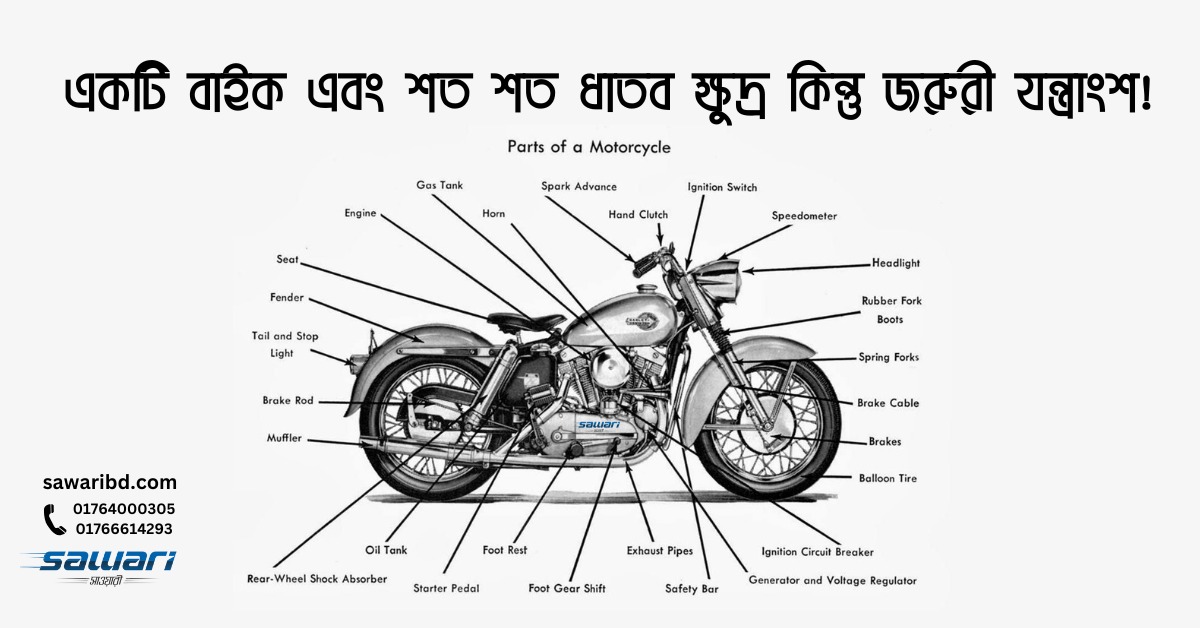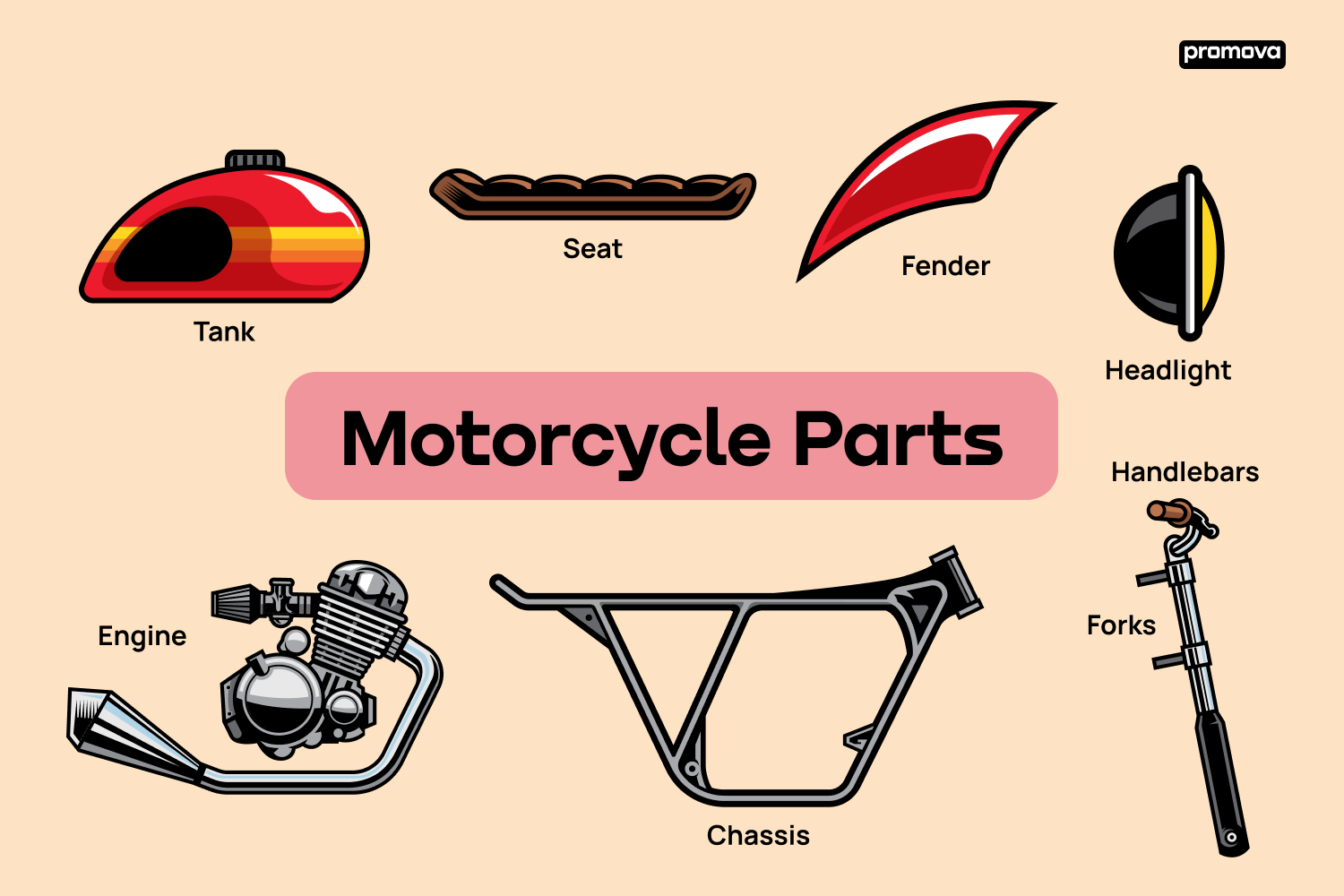Discover the Essential Motorcycle Parts You Required for Ideal Efficiency
Recognizing the important parts of a bike is essential for attaining peak performance. Each part, from the engine to the braking system, plays a crucial duty in overall capability and safety. Normal upkeep can avoid unanticipated failures and boost the riding experience. However, lots of cyclists ignore the intricacies of these systems. Uncovering exactly how they interact can result in an extra reliable ride. What important parts should every rider prioritize?
The Engine: The Heart of Your Bike
The engine acts as the core element of a motorbike, driving its efficiency and specifying its capabilities. It is accountable for converting fuel right into power, which powers the bike forward. Various types of engines are utilized, including single-cylinder, V-twin, and inline arrangements, each offering distinctive characteristics suited for different riding styles and functions. The engine size, normally gauged in cubic centimeters (cc), substantially affects efficiency, with bigger engines generally providing more power and torque.Furthermore, the engine's design and technology, such as fuel injection systems or air-cooling versus liquid-cooling, affect efficiency and reliability. Maintenance is important for peak operation; elements like regular oil changes and checking spark plugs guarantee long life. Riders commonly take into consideration an engine's responsiveness and level of smoothness, as these attributes improve the general riding experience. Eventually, the engine stays a vital aspect that defines not just the bike's efficiency however likewise the biker's link to the maker.
The Transmission: Moving Gears Efficiently
The transmission plays a vital function in a motorbike's efficiency, especially in the auto mechanics of gear changing. Recognizing exactly how to shift equipments efficiently can improve the overall riding experience, while normal maintenance assurances peak functionality. Correct interest to these aspects can greatly impact the longevity and effectiveness of the motorcycle.

Equipment Shifting Mechanics
Smooth gear shifting is crucial for excellent motorbike efficiency, considerably affecting both acceleration and control. The technicians of equipment moving involve the communication between the clutch, gear bar, and transmission system. When a biker engages the clutch, it disengages the engine from the transmission, enabling an equipment change without harming the elements. A well-timed launch of the clutch, integrated with accurate motion of the equipment bar, facilitates a smooth modification in between gears. This procedure ensures that the engine operates within its ideal power band, improving performance. Motorcycle Parts Auckland. In addition, comprehending the equipment proportions and their effect on rate and torque can help cyclists make informed choices throughout changes, inevitably contributing to a more responsive and enjoyable riding experience
Maintenance Tips Importance
Regular maintenance plays a necessary duty in ensuring that the transmission system runs efficiently, permitting for smooth equipment shifts. Consistently transforming the transmission and inspecting liquid is crucial, as old liquid can lead to increased rubbing and wear. Additionally, inspecting the clutch for wear assurances peak involvement and disengagement, preventing slippage during equipment changes. Lubrication of relocating parts is similarly vital to minimize rubbing and boost efficiency. Bike owners must also check for leaks and unusual noises, as these can show underlying concerns. By sticking to these upkeep pointers, riders can prolong the life expectancy of their transmission system, ensuring that gear shifts remain smooth and contributing to the total performance of their motorcycle.
The Braking System: Ensuring Safety And Security on Every Experience
Braking systems are essential components that straight influence a motorcycle's security and performance. They include different components, including brake pads, blades, calipers, and hydraulic lines, all interacting to ensure efficient deceleration. The type of stopping system-- normally either disc or drum-- impacts responsiveness and stopping power.Regular maintenance is important to support peak efficiency; used brake pads can result in reduced effectiveness and increased stopping distances. In addition, the high quality of brake fluid should be checked, as it can absorb dampness over time, jeopardizing braking efficiency.Riders should also think about the relevance of anti-lock braking systems (ABS), which stop wheel lockup during sudden stops, enhancing general safety and security. Properly working brakes are not nearly stopping; they infuse confidence in the motorcyclist, allowing for safer navigation via different terrains. Eventually, a trustworthy braking system is important for delighting in every experience with peace of mind.
The Suspension: Enhancing Comfort and Control
A well-functioning suspension system greatly adds to a motorbike's general performance, complementing the effectiveness of the braking system. The suspension plays a substantial role in soaking up shocks from uneven surfaces, assuring a smoother ride while preserving tire contact with the road. This contact is vital for both security and control, enabling motorcyclists to browse corners with self-confidence and precision.Different types of shock absorber, such as telescopic forks or mono-shocks, offer varying levels of comfort and handling. Appropriately tuned suspension enhances responsiveness, providing the motorcyclist with a much more connected feel to the motorbike. Routine maintenance checks are important to determine the suspension parts, including springtimes and dampers, are working at their ideal. An efficient suspension system not only boosts the riding experience but also adds to the durability of other motorcycle components by minimizing deterioration. Consequently, purchasing top quality suspension is crucial for any kind of severe motorbike fanatic.
The Tires: Attaching You to the Roadway
Tires play an essential function in a motorcycle's efficiency, functioning as the key web link in between the biker and the road. Comprehending the various kinds of tires available can substantially influence taking care of and security. Furthermore, normal maintenance is important to assure peak tire performance and durability.
Tire Enters Explained
How do various tire types affect a motorbike's performance? Tire types play an essential role in determining a motorcycle's handling, stability, and grip. Sport tires, made for high efficiency, deal improved traction and responsiveness on smooth roads, making them excellent for racing and aggressive riding. Alternatively, visiting tires prioritize toughness and convenience, supplying a smoother experience for long-distance Recommended Reading traveling. Off-road tires, identified by their tough walk patterns, master grip on unpaved surface areas, ideal for adventure enthusiasts. Additionally, dual-sport tires blend attributes from both on-road and off-road categories, satisfying functional riding requirements. Ultimately, selecting the appropriate tire kind is necessary for enhancing performance, making certain safety and security, and improving the overall riding experience.
Upkeep Tips Offered
While riding when traveling, maintaining ideal tire problem is important for safety and efficiency. Frequently checking tire stress is essential, as under-inflated tires can lead to inadequate handling and enhanced wear. It is advisable to check step deepness frequently; used tires compromise hold and stability. Additionally, bikers need to try to find indicators of damage, such as splits or bulges, which can suggest the need for replacement. Turning tires occasionally assures also wear, enhancing durability. Maintaining tires clean from debris and staying clear of excessive curbs can prolong their life expectancy. Lastly, keeping proper positioning and equilibrium contributes to come to a my latest blog post head efficiency, decreasing tension on various other bike parts. Complying with these maintenance suggestions will significantly boost the total riding experience.
The Fuel System: Sustaining Efficiency and Efficiency
The fuel system plays a crucial role in maximizing a motorbike's performance and effectiveness, as it ensures the optimal delivery of fuel to the engine. It comprises numerous essential components, consisting of the fuel tank, gas pump, gas filter, and fuel injectors or carburetor. Each component must operate effectively navigate to this website to assure a smooth and powerful ride.The fuel tank stores gasoline and supplies it to the engine by means of the fuel pump, which produces the required pressure. A gas filter protects against impurities from entering the engine, while the injectors or carburetor mix gas with air for combustion.Proper upkeep of the gas system is essential; a stopped up filter or malfunctioning injector can cause lowered efficiency and increased gas usage. By verifying that the fuel system operates efficiently, riders can enjoy better throttle reaction, far better gas economic climate, and in general enhanced riding experience.
The Electric System: Powering Your Trip
An efficient electrical system is important for the overall performance and security of a motorbike, as it powers important components such as the ignition, lights, and different electronic systems. This system includes the battery, which stores power, and the alternator, responsible for producing power while the engine runs. The circuitry harness links these components, ensuring trusted power distribution.Additionally, integrates secure the system from overloads, while relays assist regulate high-current gadgets with low-power signals. A properly maintained electrical system boosts efficiency by making sure smooth starts and consistent procedure of lights and signals, crucial for rider presence and safety.Regular checks of the battery's charge and links are necessary for avoiding electric failures. Motorcyclists must also check wiring for damage, making sure all components work ideally. Ultimately, a robust electric system contributes significantly to the overall efficiency and dependability of the motorcycle.
Frequently Asked Concerns
Just how Frequently Should I Change My Motorcycle's Battery?
The frequency of bike battery substitute depends on use and upkeep (Bike Parts Wellington). Normally, batteries need to be replaced every three to five years. Normal checks can aid identify when a replacement is needed for peak efficiency
What Devices Do I Need for Fundamental Bike Upkeep?
For basic motorcycle maintenance, one needs essential tools such as a socket set, wrenches, screwdrivers, pliers, tire stress gauge, and a torque wrench. These tools help with efficient maintenance and assure the motorcycle runs efficiently and safely.
Exactly How Can I Boost My Motorbike's Aerodynamics?
To improve motorbike aerodynamics, one need to consider adjusting fairings, utilizing windshield extensions, optimizing body setting, and minimizing general weight. These modifications help reduce drag, enhancing stability and gas performance throughout experiences.
What Are the Signs of a Failing Electrical System?
Signs of a failing electrical system include dimming lights, difficulty starting, uneven instrument readings, and blown integrates. Bike Parts Wellington. Unusual smells or rust around battery terminals may also show underlying problems needing immediate attention for safety and security and efficiency

Just how Do I Select the Right Oil for My Motorbike?
When selecting oil for a bike, one ought to consider the manufacturer's specifications, viscosity ratings, and the kind of riding. Furthermore, synthetic versus traditional oil can influence efficiency and engine security, affecting the choice greatly. The engine size, typically determined in cubic centimeters (cc), considerably affects efficiency, with larger engines generally offering more power and torque.Furthermore, the engine's design and technology, such as gas injection systems or air-cooling versus liquid-cooling, affect performance and integrity. A well-functioning suspension system considerably contributes to a motorbike's total efficiency, matching the efficiency of the braking system. The gas system plays a vital duty in making best use of a motorcycle's performance and efficiency, as it assures the ideal delivery of gas to the engine. A gas filter protects against pollutants from entering the engine, while the injectors or carburetor mix fuel with air for combustion.Proper upkeep of the fuel system is essential; a clogged filter or malfunctioning injector can lead to decreased performance and boosted fuel intake. A well-kept electric system enhances performance by making sure smooth beginnings and consistent operation of signals and lights, vital for biker presence and safety.Regular checks of the battery's fee and links are important for avoiding electrical failings.
Comments on “How-To Guide for Installing New Motorbike Components NZ on Older Bikes”